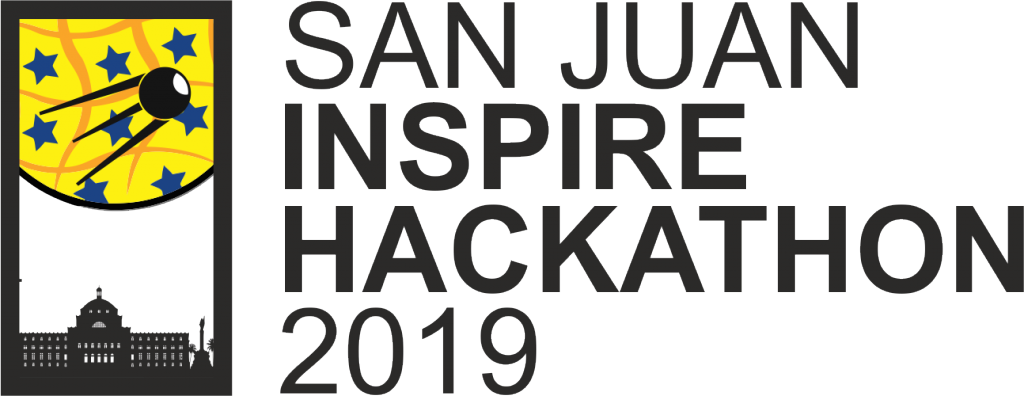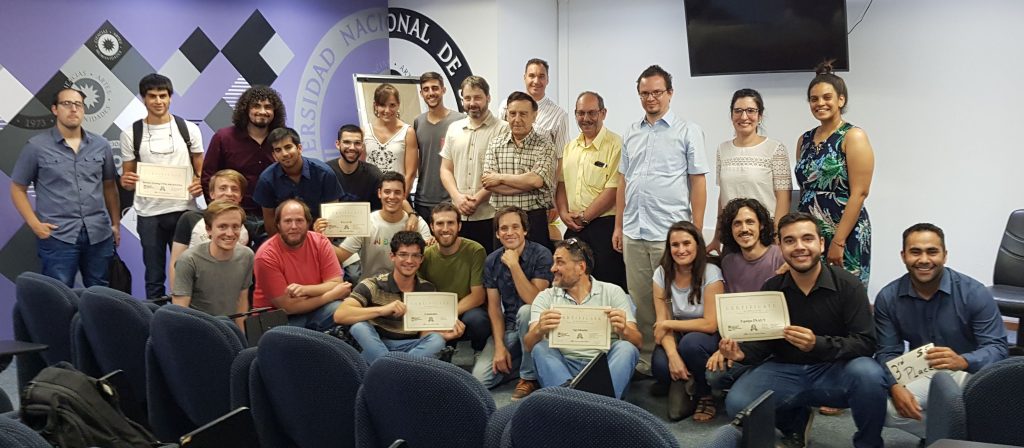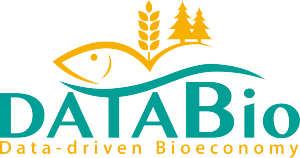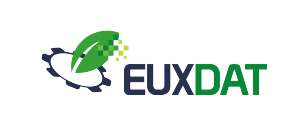
Making climate-related decisions using relevant data
The aim of this hackathon is to leverage a combination of sensors, climatic services, and Earth Observation data in agriculture.
The San Juan INSPIRE Hackathon 2019 is one of the satellite INSPIRE hackathons. The hackathon is second DataBio and the first EUXDAT hackathon held outside the EU, also other EU projects are involved, namely: AgriClima, NextGEOSS, EO4Agri AFarCloud and Stargate.
The hackathon is a collaborative event organized by the University of West Bohemia, National University of San Juan, Lesprojekt, WirelessInfo and Plan4all.
RESULTS

The #SanJuanINSPIREHackathon is over. All the teams did excellent work! The jury was impressed and it was really hard to evaluate the projects and select the winner.
Finally, the results are:
- 1st place – Agrohacks
- 2nd place – Cammalot
- 3rd place (with the equal score) – Equipo INAUT & P.G.I.C.H
- 4th place – Remote Sensing UNSJ Argentina
Final presentations of the team’s projects follow.
Agrohacks
Down To Earth ~ a tool alerting farmers about forecasted severe weather conditions
Cammalot
Forecast enhancement with weather station data
Equipo INAUT
Application for reduction of agrochemicals in crops
PGICH
Water and temperatures analysis for wine production
RS UNSJ
Remote sensing data for agriculture
Provided data, tools and other infrastructure
The registered teams will be provided with three preprocessed data sets from the surroundings of San Juan:
- Climatic data downloaded from Copernicus Climate Data Store, namely ERA 5-Land data.
- Digital Elevation Model downloaded from SRTM, resp. the source OF DEM is ALOS Global Digital Surface Model called AW3D30 – For more information see https://www.eorc.jaxa.jp/ALOS/en/aw3d30/index.htm (registration needed for downloading data).
- Sensor data of soil water potential, soil temperature, air temperature air humidity, from period 2016/01/26 – 2017/03/13. See a gpx file for the localization of the sensors and details about the measured quantities.
Moreover, the teams will get access to EUXDAT online platform allowing python coding together with access to the provided data (detailed information will follow.
Additionally to the data and the platform, the teams will be provided by inspiration of what can be achieved by the use of climatic data combined with sensor and elevation data by showing:
- the example of Agroclimatic Atlas Of Canada, e.g. map of Fall Freeze Dates: Average Dates of First Fall Freeze for an example of the desired result.
- a proposed basic experiment to follow for achieving similar maps but on a much more detailed scale.
There will be a room with internet access available. However, teams are supposed to bring their own hardware.
Challenge
The teams will be then challenged to follow the basic experiment described or/and to invent their own way of potential usage of the provided data and tools.
All of the following types of outcomes are acceptable as hackathon results:
- concept of what can be achieved with the data
- basic algorithm description
- working prototype
All presented hackathon results will be then evaluated by the expert jury and the first three teams will be awarded:
- 1st prize – USD 200
- 2nd prize – USD 100
- 3rd prize – USD 50
Jury
- Dr. Ing. Oscar Raúl Dölling
(chairman)
Integrated Watershed Management, Hydraulic and Environmental Engineering Program of the UNSJ.
Dr. Lic. Arnobio Germán Poblete
Climatology program of the Institute of Geography of the UNSJ. - doc. Ing. Michal Kuráž, Ph.D.
- Department of Water Resources and Environmental Modelling, Czech University of Life Sciences Prague.
- Ing. Karel Jedlička, Ph.D.
Department of Geomatics, the University of West Bohemia, Pilsen, Czechia.
Registration
In order to participate in the hackathon, please register your team here. Please note that the expected team size is 2-6 persons. Each team should have a name (to distinguish among teams) and a contact person who will communicate with the organizers.
Venue
The hackathon takes place in the Sala Azul on the second floor of Rector’s Building of the National University of San Juan, Bartolomé Mitre 396 – Este – capital San Juan.
Preliminary timeline
The hackathon run from Tuesday 19.11.2019 to Friday 22.11.2019. Please note that the following details still can be a subject of change:
- Tuesday morning:
- 8:30 – 8:55 ~ registration of teams
- 9:00 – 9:30 ~ hackathon opening
- 9:30 – 10:00 ~ detailed information of the hackathon organization, including initial information about the hackathon topic, including a description of data to be used + platform, which can be used
- 10:00 – 11:00 ~ team’s introduction (3-5 min for each team, no presentation needed – please focus on the description of your initial idea).
- Tuesday afternoon – Friday morning
- hacking, ad hoc consultations.
- Friday afternoon
- 14:00 – 15:30 ~ Presentation of results (each team has 10 minutes for presentation + 5 minutes for Q&A
- 15:30 – 16:00 ~ Evaluation of the teams by jury
- 16:00 – 16:30 ~ Awarding and closing ceremony
ORGANISERS AND SUPPORTERS
DataBio (http://databio.eu/) – The data intensive target sector selected for the DataBio project is the Data-Driven Bioeconomy, focusing in production of best possible raw materials from agriculture, forestry and fishery/aquaculture for the bioeconomy industry to produce food, energy and biomaterials taking into account also various responsibility and sustainability issues. DataBio proposes to deploy a state of the art, big data platform “on top of the existing partners” infrastructure and solutions – the Big DATABIO Platform. The work will be continuous cooperation of experts from end user and technology provider companies, from bioeconomy and technology research institutes, and of other partners. In the pilots also associated partners and other stakeholders will be actively involved. The selected pilots and concepts will be transformed to pilot implementations utilizing co-innovative methods and tools where the bioeconomy sector end user experts and other stakeholders will give input to the user and sector domain understanding for the requirements specifications for ICT, Big Data and Earth Observation experts and for other solution providers in the consortium.
EUXDAT – (http://www.euxdat.eu) proposes an e-Infrastructure, which addresses agriculture, land monitoring and energy efficiency for a sustainable development, as a way to support planning policies. In order to do so, we need to address the problems related to the current and future huge amount of heterogeneous data to be managed and processed. EUXDAT builds on existing mature components for solving them, by providing an advanced frontend, where users will develop applications on top of an infrastructure based on HPC and Cloud. The frontend provides monitoring information, visualization, different parallelized data analytic tools and enhanced data and processes catalogues, enabling Large Data Analytics-as-a-Service. EUXDAT will include a large set of data connectors (UAVs, Copernicus, field sensors, etc.), for scalable analytics. As for the brokering infrastructure, EUXDAT aims at optimizing data and resources usage. In addition to a mechanism for supporting data management linked to data quality evaluation, EUXDAT proposes a way to orchestrate tasks execution, identifying whether the best target is a HPC center or a Cloud provider. It will use monitoring and profiling information for taking decisions based on trade-offs related to cost, data constraints, efficiency and resources availability. During the project, EUXDAT will be in contact with scientific communities, in order to identify new trends and datasets, for guiding the evolution of the e-Infrastructure. The final result of the project will be and integrated e-Infrastructure which will encourage end users to create new applications for sustainable development.
NextGEOSS (http://nextgeoss.eu/) –
The NextGEOSS project, a European contribution to GEOSS (Global Earth Observation System of Systems), is developing the next generation centralised European data hub and cloud platform for Earth Observation data, where the users can connect to access data and deploy Earth observation based applications. The concept revolves around providing the data and resources to the user communities, together with cloud resources, seamlessly connected to provide an integrated ecosystem for supporting applications. A central component of NextGEOSS is the strong emphasis put on engaging the communities of providers and users, and bridging the space in between.
EO4Agri – (http://eo4agri.eu/)
The main objective of EO4AGRI is to catalyze the evolution of the European capacity for improving operational agriculture monitoring from local to global levels based on information derived from Copernicus satellite observation data and through exploitation of associated geospatial and socio-economic information services. EO4AGRI assists the implementation of the EU Common Agricultural Policy (CAP) with special attention to the CAP2020 reform, to requirements of Paying Agencies, and for the Integrated Administration and Control System (IACS) processes. EO4AGRI works with farmers, farmer associations and agro-food industry on specifications of data-driven farming services with focus on increasing the utilization of EC investments into Copernicus Data and Information Services (DIAS). EO4AGRI addresses global food security challenges coordinated within the G20 Global Agricultural Monitoring initiative (GEOGLAM) capitalizing on Copernicus Open Data as input to the Famine Early Warning System Network (FEW-NET). EO4AGRI assesses information about land-use and agricultural service needs and offers to financial investors and insurances and the potential added value of fueling those services with Copernicus information. The EO4AGRI team consists of 11 organizations, complementary in their roles and expertise, covering a good part of the value-chain with a significant relevant networking capital as documented in numerous project affiliations and the formal support declarations collected for EO4AGRI. All partners show large records of activities either in Copernicus RTD, governmental functions, or downstream service operations. The Coordinator of EO4AGRI is a major industrial player with proven capacities to lead H2020 projects. The EO4AGRI project methodology is a combination of community building; service gap analysis; technology watch; strategic research agenda design and policy recommendations; dissemination (incl. organization of hackathons).

AFarCloud – AFarCloud will provide a distributed platform for autonomous farming, which will allow the integration and cooperation of Cyber Physical Systems in real-time for increased agriculture efficiency, productivity, animal health, food quality and reduced farm labour costs. This platform will be integrated with farm management software and will support monitoring and decision-making, based on big data and real time data mining techniques.




